Ever heard the cloud is vast?
Similarly, think of cloud hosting as a bustling and vast marketplace, where DigitalOcean has a stall, but so do other vendors. Thus, users get the best DigitalOcean alternatives, each with their own specializations and offerings.
According to last year’s trends, cloud computing has practically become the lifeblood of modern business, with 94% of companies worldwide embracing it in their operations. With the aid of cloud computing, businesses, developers, and individuals alike have access to efficient scaling solutions.
Most businesses today are adopting cloud computing technology for their workloads, which makes the choice of trustworthy cloud hosting providers extremely important. While DigitalOcean has always been a common provider, their ever-changing cloud environment has brought forth a number of DigitalOcean alternatives, each with its own set of requirements.
Table Of Content
-
FAQs
What is DigitalOcean? Overview
DigitalOcean has made a name for itself because of its low pricing, easy integration, and support for developers. With the added benefit of Droplet virtual machines, Kubernetes, and scalable block storage, DigitalOcean provides an appealing cloud service to small businesses and startup developers.
While DigitalOcean serves many, it leaves a crucial segment behind: companies that require sophisticated networking, AI-integrated infrastructure and compliance, and rock-solid web hosting solutions are left searching for the best DigitalOcean alternatives.
Related Read: Best Cloud Hosting Providers for Your Website
Why Look for DigitalOcean Alternatives? Top Reason
Unlike other providers, DigitalOcean has a few useful features to boast about, but it surely has its drawbacks, too. Simplifying processes and being integral for developers are DigitalOcean’s strong suits, but its weaknesses begin to show when talking about mid-to-large corporations.
These shortcomings include the lack of a full set of features when compared to other platforms, having a smaller number of data centers across the globe, and the increased operational costs for complicated deployments.
Platforms that aim to target a global audience and those with advanced AI-driven efficiency tools and high-performance cloud computing are most likely going to outgrow what DigitalOcean can offer. Businesses also need cloud service providers that have greater geographic redundancy, specialized hardware, or software optimizations.
Additionally, businesses with strict compliance protocols or complex security requirements find DigitalOcean’s infrastructure lacking. Thus, while DigitalOcean remains a great solution for some users, its restrictions put a burden on businesses with tough challenges, forcing them to consider other DigitalOcean competitors.
This insightful article narrows down some of the best DigitalOcean alternatives in India by feature, pricing, and ideal use cases. The cloud solutions you select as a developer, startup, or enterprise will change according to scale, cost, security, and performance.
Who should read this?
- Developers and startups in need of economical and easy-to-scale cloud services.
- Corporations are looking for a more secure and compliant global infrastructure.
- Large enterprises looking for performance-grade clouds with AI/ML capabilities.
- Freelancers and individuals looking for simplistic solutions to cloud hosting.
At the end of this read, you will have a comprehensive understanding of which DigitalOcean alternative is the best fit for your needs. Now, let’s look at the best contenders in cloud computing.
Criteria for Comparison: What to Consider When Choosing a Cloud Provider
Just like fingerprints, every business is distinct, with its own unique set of requirements. Hence, choosing a cloud provider should be approached with caution and must be based on key parameters specific to each platform. The following list contains the most important points to consider when comparing alternatives to DigitalOcean.
1. Pricing
Pricing models differ from a cloud provider’s offerings, so here are some of the most common options:
- Pay as you go: This is the most flexible option and charges based on resource utilization.
- Customized plans: It’s the most convenient driving option, especially for new businesses with low budgets.
- Cheap cloud hosting plans: These types of pricing plans help individuals and businesses store their data in the cloud and, at the same time, host their websites with cloud-integrated power.
A key point to remember is a deep understanding of the pricing structure, which includes hidden costs like bandwidth, data transfer, and storage. Make sure you read all terms and conditions to sidestep potential overspending.
2. Compute Resources
The capability to provision and control virtual machines, also known as VMs or instances, is one of the primary concerns when choosing the best and free DigitalOcean alternatives in India. Think about:
- CPU and RAM options: Diverse kinds of workloads necessitate varying levels of processing power and memory.
- Scalability: Can you easily upgrade or downgrade resources as needed? Because as your business grows, you need the flexibility to change your resource consumption.
- Storage types: Some providers supply SSD-based storage at the expense of bulk storage, while other providers provide HDD-based storage for speed. The best will be if you choose NVMe-powered SSD storage options to get bulk storage and minimal disruptions without speed compromise.
3. Storage
Cloud storage is critical to enabling data management. Check for:
- Block storage: A perfect fit for databases or for applications that need persistent storage.
- Object storage: Essential for saving substantial datasets, multimedia files, and backups.
- Backup and snapshot options: It’s important for disaster recovery and security.
4. Networking
Networking components affect performance and data delivery. Important factors include:
- Bandwidth and data transfer costs: Certain providers render free inbound data transfer but would charge for outbound data traffic.
- Load balancing: Ensure your provider offers even traffic distribution to high-availability applications with resource allocation. For instance, many providers offer traffic distribution but cost more.
- DNS management: While looking for an alternative to DigitalOcean, don’t skip the DNS settings. The DNS management ensures you have the best performance optimization for websites and applications.
5. Features & Services
Different cloud providers offer a range of services that can enhance your infrastructure, such as:
- Managed databases (PostgreSQL, MySQL, MongoDB, etc.).
- Serverless computing (e.g., AWS Lambda, Google Cloud Functions).
- Container orchestration (Kubernetes, Docker container support).
- AI/ML services for data-driven applications.
6. Ease of Use
A well-designed user interface and robust documentation can simplify cloud management. Consider the following specs in your DigitalOcean alternative:
- Control panel and dashboard usability.
- API access for automation and integration.
- Community support and knowledge base availability.
7. Scalability & Performance
In today’s fast-paced world, businesses need the agility to scale their cloud resources on demand without missing a beat. Therefore, your chosen cloud-hosting DigitalOcean alternative should allow you to scale resources dynamically without disruptions. Factors to check basically include:
- Auto-scaling capabilities for handling traffic spikes.
- Overall server performance, uptime guarantees, and latency.
8. Security
When it comes to the cloud, “Security isn’t just a priority—it’s the priority.”
Our applications and data depend on it, and we all know that the stakes are high when applications and data are involved. So don’t forget to evaluate the following security measures:
- Firewalls and DDoS protection.
- Data encryption (at rest and in transit).
- Compliance certifications (ISO, SOC, GDPR, HIPAA, etc.).
9. Geographic Availability (Regions and Zones)
The selection of providers is greatly influenced by the geographic location of the users. This is due to latency and performance issues. Some of these factors are as follows:
- Expanded audience for content delivery.
- Increased availability zones for added redundancy and catastrophe recovery.
These criteria can help businesses as well as developers find their most suitable DigitalOcean alternative in terms of workload, finances, and performance.
Top 10 DigitalOcean Alternatives: Selecting the Best Cloud Solution for You In India
Remember not to jump into a decision lightly. Choosing a suitable DigitalOcean alternative can be tricky, especially when considering the range of features and pricing each competitor has to offer. So have a look at the top 10 of the best alternatives available.
1. MilesWeb
Overview: MilesWeb steps into the picture as one of the foremost cloud hosting solutions within the industry with its stackable, high-performance cloud solutions. Developers, individuals, and newbies, as well as enterprises using MilesWeb, receive the best support, while startups get affordable rates that allow their businesses to scale. Their overall ratings, resources, unbeatable prices, and features make them #1 in the list of the top 10 DigitalOcean alternatives in India.
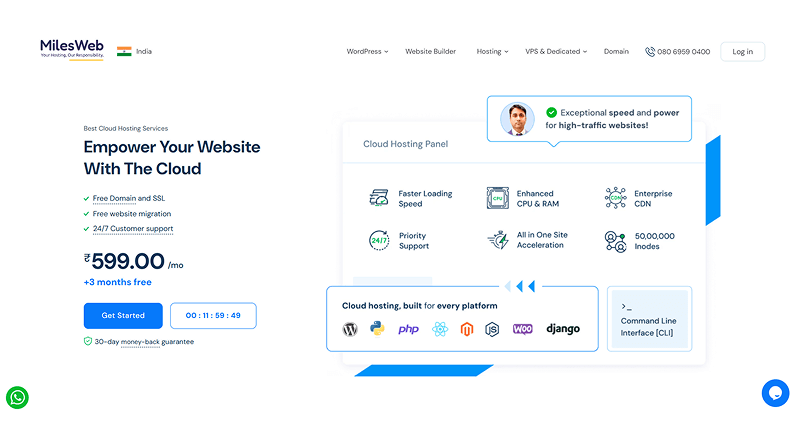
– Key features of MilesWeb as an alternative DigitalOcean:
- 24×7 expert support.
- SSD NVMe cloud hosting with complete storage.
- Variable workload.
- Scalable cloud instances.
- Cost-free website migration.
- Users also get free domains, daily backups, and SSL certificates.
- Multi-location data centers to improve loading speed.
– Pricing:
MilesWeb has created a flexible system that allows users to choose from customized cloud hosting plans. Moreover, they have indeed kept the cost low, benefiting the large businesses to grow more and small businesses/individuals to start cost-effectively.
– Best use cases:
- Cost-efficient cloud hosting for small businesses.
- Solid marketing infrastructure for developers.
- Secure and high-quality hosting for e-commerce websites.
– Pros and cons:
| Pros | Cons |
| Excellent service at very competitive rates. | Focus on specific niches. |
| Managed services eliminate complex processes. | Best for growing businesses. |
| Outstanding customer service is available 24/7. |
2. OVHCloud
Overview: Specializing in dedicated servers and cloud computing, OVHCloud is a cloud service based in Europe. They are particularly popular among companies that have data residency and data compliance requirements.
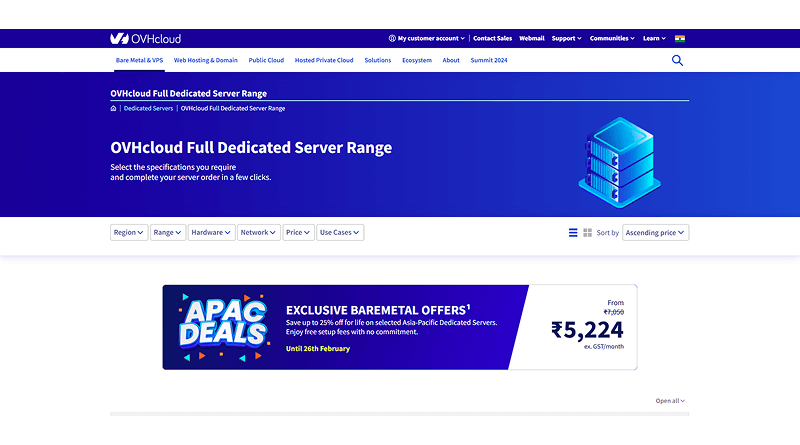
– Key features of OVHCloud as an alternative DigitalOcean:
- Dedicated servers are offered at reasonable prices with robust hardware.
- Custom cloud services with varying levels of complexity are available.
- Businesses prioritizing GDPR compliance have strong security and compliance.
- Their significant presence in Europe enables them to serve the EU users well.
– Pricing:
OVHCloud provides competitive pricing, often lower than DigitalOcean for dedicated servers and bare metal instances. Some cloud services are, however, more affordable than OVHCloud and DigitalOcean for instance, MilesWeb.
– Best use cases:
- Businesses using the cloud for hosting services with a compliance focus.
- People looking for competitively priced, powerful, dedicated servers.
- Programmers who want to customize their environment to a high degree.
– Pros and cons:
| Pros | Cons |
| Low-cost dedicated servers. | Difficult to use as other cloud hosting providers. |
| Privacy and data protection policies. | Some support services can be expensive. |
| High-level web hosting with custom plans. |
3. Kamatera
Overview: Kamatera is a globally recognized cloud provider with data centers located all around the world. The presence of global servers gives users the flexibility and credibility to choose them as a DigitalOcean alternative. Known for its high performance, Kamatera provides the ability to customize an infrastructure within the cloud.
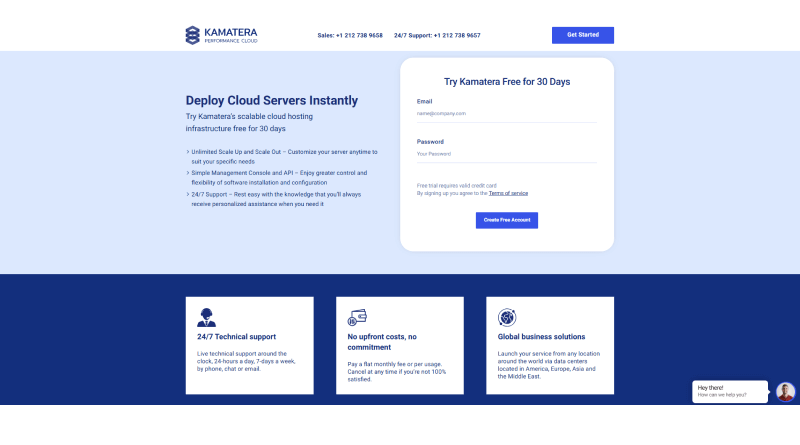
– Key features of Kamatera as an alternative DigitalOcean:
- Ability to configure a custom pricing scheme.
- Provisioning a large selection of virtual machines with specific configurations.
- Data centers spread around continents, resulting in low latency.
- The infrastructure is designed to be scalable, which means that it can grow alongside the users’ requirements.
– Pricing:
Kamatera is noted for its fully flexible pricing model, wherein users are charged only for the services consumed. For relatively smaller workloads, it could be more cost-effective than DigitalOcean yet considerably higher for bigger deployments.
– Best use cases:
- Technology-based businesses that are looking for rapid scaling options
- Software developers looking for specific virtual machines
- Firms wanting to expand their operations using a continent-wide cloud structure.
– Pros and cons:
| Pros | Cons |
| Provisioning of customer-specific cloud solutions | Advanced configurations require substantial technical expertise. |
| A vast network of data centers worldwide to serve customers better | Does not give free tier plans for several services offered. |
| No commitment fees and pay-as-you-go terms |
4. DreamHost
Overview: Apart from serving as a reputable web host, DreamHost provides users with cloud computing services branded as DreamCompute. It is well known for its low-priced services and ease of use.
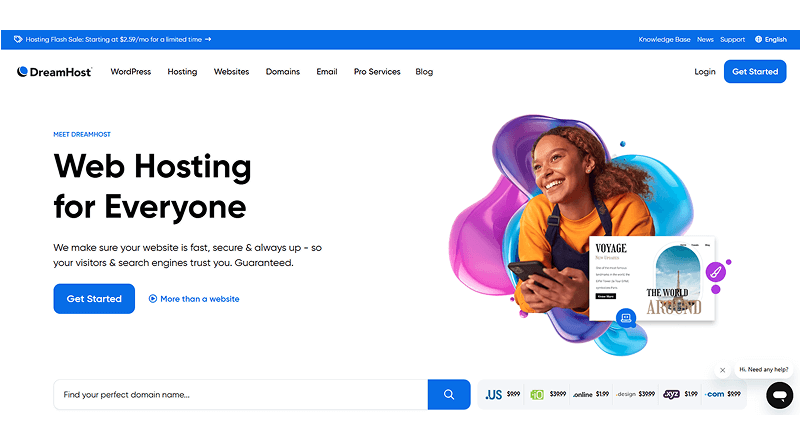
– Key features of DreamHost as an alternative DigitalOcean:
- Vertically scalable instances of VPS allow easier virtual machine control.
- High-speed performance due to the SSD.
- No locks into contracts with the provider, allowing for effortless migration to other services.
- Marked prices without any free, surplus, or hidden charges.
– Pricing:
DreamHost cloud hosting is a cost-effective option. Hence, it is a good competitor to DigitalOcean, targeting tight-fisted consumers.
– Best use cases:
- Budget restraints freelancers and small-scale developers who need flexible hosting services.
- Users who need support for OpenStack.
- Unmanaged cloud hosting users that require a simple solution.
– Pros and cons:
| Pros | Cons |
| Easily understandable pricing with no hidden costs. | Fewer data center locations than competitors like MilesWeb. |
| Flexible due to the use of the open-source OpenStack technology. | Limited enterprise-grade features compared to AWS, Google Cloud, etc. |
| Easy migration due to the absence of vendor lock-in. |
5. Hostinger
Overview: Hostinger is a widely accepted name in the cloud hosting space, as it is affordable and easy to use. The company provides cloud VPS and shared hosting, which makes it a good choice for developers, individuals, and small businesses looking for VPS cloud hosting options.
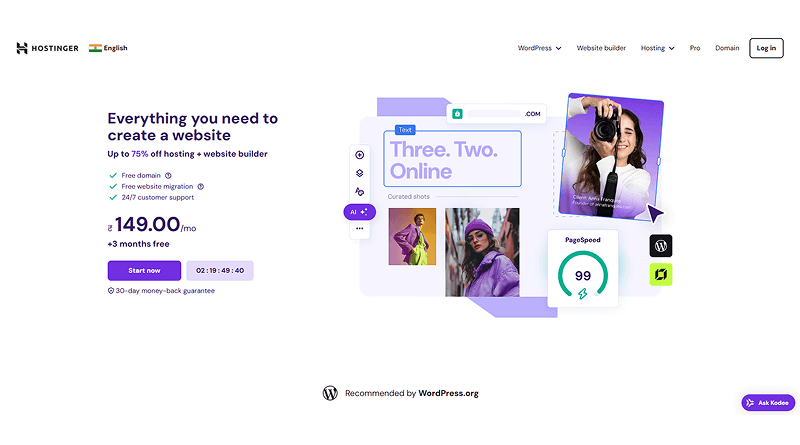
– Key features of Hostinger as an alternative DigitalOcean:
- Cloud hosting with SSD is very affordable.
- They have an in-house-built control panel.
- Cloud hosting is fully managed and has automatic updates.
- Better performance through guaranteed resources.
- Cost-free domains, daily backups, and SSL are offered without any charges.
– Pricing:
Hostinger has less advanced cloud services, which automatically makes them a cheaper DigitalOcean alternative. Also, their long-term contracts have a lower monthly fee. However, ensure you check the renewal costs, as they are expensive when compared to other competitors, MilesWeb.
– Best use cases:
- Developers who need a straightforward, managed cloud hosting system.
- Personal blogs, websites, and small applications.
– Pros and cons:
| Pros | Cons |
| Low introductory prices. | Compared to MilesWeb, Google Cloud, and AWS, scalability is limited. |
| Beginners will find the interface very easy to use. | Enterprise applications with high-performance needs aren’t ideal for this service. |
| Free domains and SSL are provided. | High renewal charges are proposed at the end of introductory rates. |
6. InMotion Hosting
Overview: InMotion Hosting is popular for its web hosting services. The company provides cloud VPS services that are secure, well-supported, and high-performance. They also offer customized plans for small businesses and developers who want low-cost yet dependable cloud computing solutions.
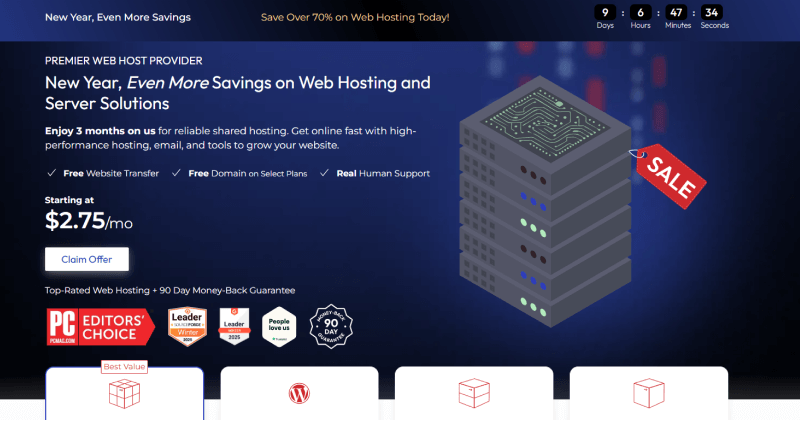
– Key features of InMotion Hosting as an alternative DigitalOcean:
- Cloud VPS with full or self-service options.
- Dedicated resources for high-performance SSD storage.
- Free server maintenance and updates.
- Comprehensive security, including DDoS protection.
- Performance-optimized data centers.
– Pricing:
The pricing structure of InMotion Hosting differs as per the plan you select. Their unmanaged cloud VPS prices begin at cheaper costs, while if you want managed support, then the costs are expensive as compared to other providers like MilesWeb. However, it is still an affordable DigitalOcean alternative.
– Best use cases:
- Startups and small enterprises looking for a managed cloud hosting provider.
- Developers looking for managed VPS hosting.
- E-commerce sites that need guaranteed uptime and robust security.
– Pros and cons:
| Pros | Cons |
| Excellent uptime with fast SSD and high-speed internet. | There is limited geographical diversity within the data centers in the US. |
| Choice of managed and unmanaged cloud VPS hosting. | There are fewer advanced cloud options. |
| Free migration and mitigation security products. | The user interface is difficult to understand, especially for beginners. |
7. Liquid Web
Overview: Liquid Web is a best-in-class provider of cloud hosting services that specializes in high-performance managed solutions. It is a reliable choice for companies with requirements for high-level security, performance, and support.
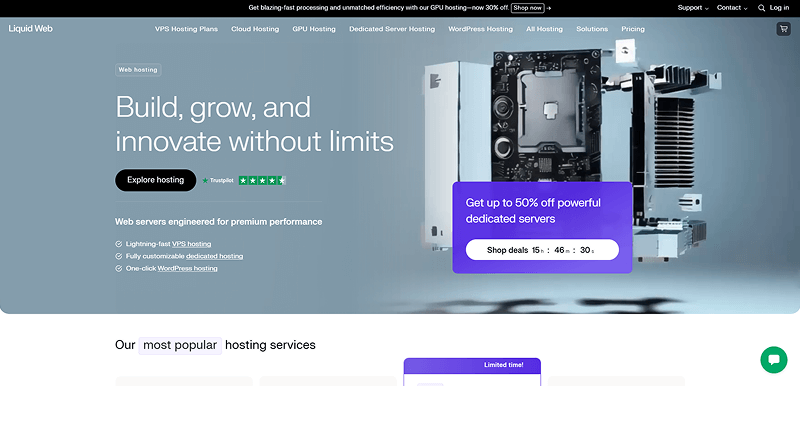
– Key features of Liquid Web as an alternative DigitalOcean:
- Cloud servers and infrastructures with assured service delivery support.
- Provisioning through fast SSD storage.
- DDoS protection, firewalls, and other protective measures.
- Customer relations and support are available 24/7/365.
- Tailored cloud VPS and dedicated cloud servers.
– Pricing:
While Liquid Web’s cloud hosting plans are more expensive compared to DigitalOcean, they are still worth it as they offer fully managed services. Furthermore, you’ll also find other plans, such as Cloud VPS.
– Best use cases:
- Cloud servers for a managed hosting service for enterprises that require such infrastructure.
- Online stores and large-scale projects.
- Companies that need high security and compliance.
– Pros and cons:
| Pros | Cons |
| Managed services with great tech support. | Pricing is on the higher end compared to other cloud hosts like MilesWeb. |
| Competitive security as well as DDoS protection. | Not suitable for small businesses and independent developers on a tight budget. |
| Cost-effective for high-performance cloud services. |
8. Google Cloud
Overview: Google Cloud is a preeminent cloud service provider for developers, enterprises, and AI-based applications. It has built a reputation for its global infrastructure, AI/ML tools, and scalable computer instances. While Google Cloud is a powerhouse in the cloud arena, it falls short when it comes to the specific needs of web hosting.

– Key features of Google Cloud as an alternative DigitalOcean:
- AI/ML tools for data analytics and automation.
- Offers Kubernetes and Google Compute Engine.
- Robust security, including compliance with global standards.
- Data centers around the globe provide low latency.
– Pricing:
Since Google specializes in cloud instances only (no web hosting services included), it has a more developed pricing infrastructure. For example, users get the per-second billing with pay-as-you-go plan options. Plus, free credits are allocated for new users. Nevertheless, it’s a notable point that general-purpose instances are more expensive than DigitalOcean but cheaper for AI workloads.
– Best use cases:
- AI, ML, or big data analytics enterprises.
- Companies that require a cloud infrastructure for large-scale apps.
- Kubernetes developers use a container cloud environment.
– Pros and cons:
| Pros | Cons |
| Machine learning & AI-powered services. | Lack of experience leads to a high learning curve. |
| Security and compliance for enterprises. | Basic cloud hosting on DigitalOcean is cheaper. |
| Multiple data centers around the world. |
9. IBM Cloud
Overview: IBM Cloud turns out to be a hybrid cloud provider concentrating on enterprise AI, blockchain technology, and security-centric solutions. It fits ideally for companies needing advanced cloud computing and data science.
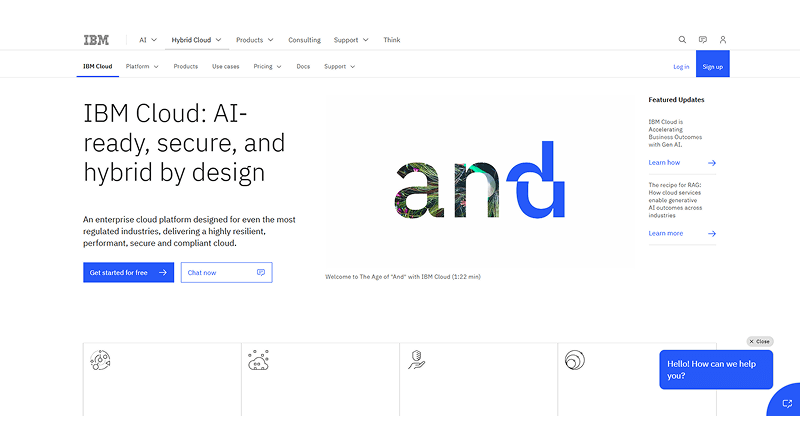
– Key features of IBM Cloud as an alternative DigitalOcean:
- Analytics and automation are provided by AI-powered Watson services.
- Seamless integration of on-premises with cloud performance using hybrid cloud architecture.
- Enhanced security and compliance systems.
- High-performance computing with bare metal servers.
- An international network of data centers.
– Pricing:
Like most of the cloud providers, IBM Cloud also works on the pay-as-you-go pricing module with flexible expenditure options. Although it is an expensive DigitalOcean alternative. Similarly, they have minimal features applicable to enterprises in comparison to MilesWeb and web hosting providers mentioned in our list.
– Best use cases:
- AI applications and big data analytics.
- Visited by enterprises needing hybrid cloud solutions.
- Companies bearing high security and compliance prerequisites.
– Pros and Cons:
| Pros | Cons |
| Robust AI and big data technologies. | It is difficult to learn due to the technical nature of the subject. |
| Flexibility of hybrid cloud models. | Using DigitalOcean is comparatively easier. |
| Enhanced security, e.g., data breach protection. |
10. AWS (Amazon Web Services)
Overview: AWS is a successful and understanding cloud provider, offering thousands of uses for computing, storage, AI, networking, and even security. It is a platform choice for scalability and enterprise applications.

– Key features of AWS as an alternative DigitalOcean:
- Highly secure cloud environment with compliance certifications.
- Global infrastructure with multiple availability zones.
- AWS Lambda for serverless applications.
- The free market utility is used along with other services.
- Proven, capable, cost-effective, and scalable clouds on the infrastructure.
Related Read: DigitalOcean vs AWS Cloud Platform
– Pricing:
The pricing structure of AWS is more cost-effective than DigitalOcean. They also bring the concept of 12-month subscriptions with free tier availability. However, AWS’s high flexibility is tough to navigate. Thus, it’s advisable to choose simplified options like MilesWeb. They handle the technical complexities of setup, configuration, and maintenance without compromising the features of the managed AWS cloud.
– Best use cases:
- Machine learning, data analysis applications.
- Large enterprises that need global scalability.
- Enterprises with high amounts of traffic and security requirements.
– Pros and cons:
| Pros | Cons |
| Global availability and security. | It is overwhelming for a small project. |
| Massively advanced scalability and flexibility. | It greatly complicated the pricing structure. |
| AI, ML, and cloud computing are best in class. |
Framework for Making the Choice: Best DigitalOcean Alternative
When it comes to making a decision, be it single or multiple use, keep these aspects in mind:
– Expenses Limit
What’s your budget like? With some cost control in mind, OVHCloud, MilesWeb, and Hostinger have great VPS packages for you. For spending without concern, Liquid Web and AWS offer extensive premium value features.
– Knowledge Limit
Are you an expert or a learner? For people on the novice side, MilesWeb, Hostinger, Inmotion Hosting, and DreamHost provide a basic-level interface for seamless accessibility. For experts, AWS, Google Cloud, and Kamatera offer scalable and flexible services; however, knowledge of the tool is necessary.
– Software Tools Needed
What application are you building? For primary use cases like blogging or website creation, InMotion Hosting, Hostinger, MilesWeb, and DreamHost have got you covered. For SaaS platforms and business apps, Kamatera, MilesWeb, and Liquid Web will do the job. For data analysis, big data, and AI/ML, AWS, Google Cloud, and IBM Cloud are your go-tos.
– Growth Possibilities
Are you expecting a lot of change quickly? For instantaneous growth templates, try MilesWeb, Google Cloud, Kamatera, and AWS. If you’re looking for gradual scalability and growth, MilesWeb, InMotion Hosting, and Liquid Web are great options.
– Additional requirements
Do you need serverless functions, databases, etc.? For managed databases, try MilesWeb, AWS, Google Cloud, and IBM Cloud. For serverless functions, try Google Cloud Functions and AWS Lambda. For DDoS protection, try MilesWeb, OVHCloud, and Liquid Web.
First and foremost, your budget, skill level, scalability needs, and other essential requirements for your specific project will determine the appropriate choice of cloud provider. In our blog, the #1 position is ranked by MilesWeb. Whether the talk is about benefits for startups, developers, and businesses or the budget-friendly, scalable, feature-rich solution, MilesWeb cloud hosting fulfills each criterion at its best.
Other web providers like OVHCloud, Kamatera, DreamHost, Hostinger, InMotion Hosting, and Liquid Web have specific services for specialized customers, while AWS, Google, and IBM provide services exclusively to enterprise customers.
Take a look at MilesWeb and other providers to see which one offers the right cloud solution for you. Check their official platforms for further details. Remember, prices and plan structures change according to seasonal offers, marketing campaigns and sales. So always double-check the exact cost you pay.
FAQs
How do the above DigitalOcean alternatives compare to DigitalOcean in terms of pricing?
As with other cloud providers, pricing schemes differ widely among vendors. Unlike DigitalOcean, competitors like MilesWeb, Hostinger and other web hosts offer straightforward and easily understandable billing. While some providers like Liquid Web and IBM are more expensive than DigitalOcean, they offer managed solutions. Furthermore, the pricing structure of each provider differs according to the instance types, storage options, and data transfer rates to provide the optimal value.
Which alternative is best for startups?
The choice of the best DigitalOcean alternative for a startup depends on your startup’s requirements. However, the reviews, features, price, and customer support make MilesWeb Managed cloud hosting services easier for startups. They offer affordable, managed cloud hosting.
Along with MilesWeb, OVHCloud, Kamatera, DreamHost, Hostinger, InMotion Hosting, and Liquid Web, we also provide VPS and cloud solutions for early-phase projects.
How do we evaluate the ease of use and user experience of different cloud platforms?
Each provider mentioned in the above article uses different UI/UX design trends and complexities. Thus, the ease of use and user experience of different cloud platforms will be quite different. Some common grounds for evaluation include effective software, appealing design, 24/7 support, and easy navigation.
Some providers also offer a trial period or money-back guarantee, just as MilesWeb does. This feature helps us check each feature and plan offered by the provider before signing up for the long term.
What are the future trends in cloud computing?
A few of the latest patterns in cloud computing are serverless computing and function as a service (FaaS). These are recently developed and popular among developers who do not want to maintain infrastructure.
The use of IoT devices has led to the emergence of containers and the improvement of deployment and scaling of applications with the help of orchestration tools such as Kubernetes. Integrating AI and ML services like GPU cloud and deep learning cloud into platforms has been on the rise recently. It helps ease the work for companies to make information-driven business decisions. Last but not least is the increased focus on cloud service security and compliance.















